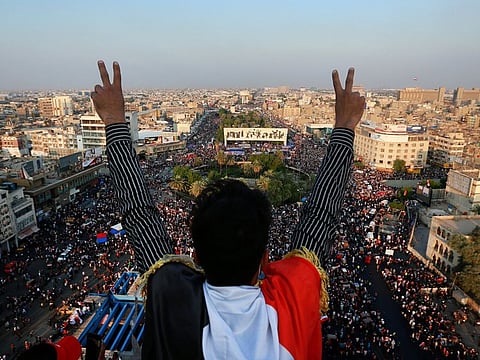Iraqis pour into streets for biggest protest yet
We are here everyday until the regime falls, protesters say

Baghdad: Thousands of Iraqis thronged central Baghdad on Friday demanding the root-and-branch downfall of the political elite, in what was expected to become the biggest day of mass anti-government demonstrations yet.
Protests in which 250 people have died over the past month have accelerated dramatically in recent days, drawing huge crowds from across Iraq’s sectarian and ethnic divides to reject the political parties in power since 2003.
Thousands have been camped out in Baghdad’s central Tahrir Square, with many thousands more joining them by day. Friday, the Muslim day of prayer, was expected to draw the biggest crowds yet, with many taking to the streets after worship.
More than 50 people were wounded overnight and early Friday morning, police and hospital sources said.
By late morning hundreds were marching to the square from side streets, condemning elites they see as deeply corrupt, beholden to foreign powers and responsible for daily privations.
In recent days protests have been comparatively peaceful by day, joined by elderly people and young families, becoming more violent after dark as police use tear gas and live ammunition to battle self-proclaimed “revolutionary” youths in the street.
Amnesty International said on Thursday security forces were using “previously unseen” tear gas canisters modelled on military grenades that are 10 times as heavy as standard ones.
Checkpoints
In Baghdad, protesters had set up checkpoints in the streets leading into and surrounding Tahrir Square, redirecting traffic.
New arrivals joined and assisted those who had camped overnight.
A group of young people were sweeping the streets in to “make things comfortable” for fellow protesters.
Mohammed Najm, an engineering graduate with no job, said the square had become a model for the country he and his comrades hope to build: “We are cleaning streets, others bring us water, they bring us electricity, they wired it up.
“A mini-state. Health for free, tuk-tuks transporting for free,” he said.
“The state has been around for 16 years and what it failed to do we did in seven days in Tahrir. If they can’t do it, leave.”
Many were singing about the sit in.
Helmets and gas masks were now a common sight. A group of middle-aged women sat making falafel sandwiches.
“We are making food for the protesters. They are our sons and brothers,” said Umm Idrees, mother to three university graduates who have all failed to find jobs.
“We are here until the regime falls, every day.”
Al Sistani gives nod to protests
In his weekly sermon, top Shi’ite cleric Grand Ayatollah Ali al-Sistani warned of “civil conflict, chaos and destruction” if the security forces or paramilitary groups crack down on the protests. And he gave an apparent nod to protesters who say the government is being manipulated from abroad, above all by Iran.
“No one person or group or side with an agenda, or any regional or international party, can infringe upon the will of Iraqis or force an opinion upon them,” Sistani’s representative said during a sermon in the holy city of Kerbala.
Many see the political class as subservient to one or another of Baghdad’s main allies, the United States and Iran, who use Iraq as a proxy for a struggle for regional influence.
“The leadership is controlled by Iran,” said barber Amir, 26. “When we make demands we shouldn’t even talk to the government, we should talk to Iran. We don’t have a government.”



